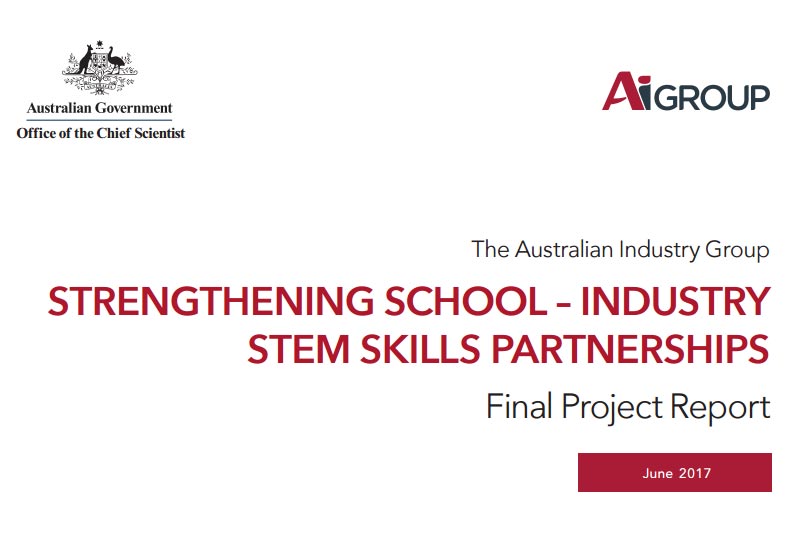
Featured image from the Ai Group's report on STEM skills
A report on Science, Engineering, Technology and Mathematics (STEM) skills in Australia entitled ‘Strengthening School-Industry STEM Skills Partnerships’ was released today by the Australian Industry Group. The group is the country's peak industry association, representing 60,000 businesses employing more than 1 million staff.
The report is the outcome of a two-year research project funded by the Office of the Chief Scientist to improve student participation in STEM-related disciplines by encouraging school and industry collaboration. The need to improve teacher and student understanding of the demand for STEM skills in the workplace, and to encourage students to consider further study and a career in STEM was also investigated.
Australia's Chief Scientist, Dr Alan Finkel, praised the report saying, “We need to provide our teachers with the best possible support and professional development, so they in turn are well positioned to inspire students. This project does an impressive job identifying models of schools and industry working together that we can learn from and scale up.”
The first part of the project, involving extensive school-industry STEM mapping, taking stock of existing programs led to the production of the SPI Index 2016, a resource providing a comprehensive guide to some 250 programs and initiatives across Australia. It had been widely disseminated across states and territories.
Challenges
It is commonly accepted that there has to be greater industry involvement in eduation to equip students with the right skills for the jobs of the future. However, an array of challenges is faced in implementation.
The study found that senior management interest alone was not sufficient for industry commitment. Finding enthusiastic individual staff was critical to successful engagement with schools. Sometimes, it was easier to negotiate with small local companies which had more flexibility in terms of time. In some larger companies, especially with existing STEM initiatives, the only way to engage was through employees volunteering for programs.
Another challenge was the engagement level of the students. Interacting with reluctant students can be very disengaging for companies and staff volunteers. But those same disengaged students are the ones who are in greater need of being enthused and inspired. Intermediaries and teachers can assist with this.
Although most teachers expressed interest in partnerships with industry, they also found this type of engagement unfamiliar and lacked any training in how to proceed. They were unsure of what was expected of them and some viewed these initiatives as ‘extra’ rather than as providing an alternate delivery mode or as a way of enhancing existing programs.
Teachers being too busy and overloaded, cost of teacher relief time and inflexible timetables were often given as reasons for schools not engaging. Staff movements also hindered collaboration projects with industry.
In some locations, it was challenging to align the companies with teachers’ interests. Issues were also faced with the fit between the type of companies and the curriculum and year level.
A general tendency was observed with schools and education systems tending to separate the role of VET (vocational education and training) and STEM. This may arise from a misconception that STEM is for only academic students, suggesting outdated stereotypes about the nature of industry and business in the 21st century and lack of exposure to 21st century industry.
Project attrition was observed due to a variety of reasons from amalgamation and significant disruption including staff losses to lack of support from colleagues and existing commitments. Some of the schools and teachers stopped communicating. This issue with communications seems to represent a failure to understand basic protocols for industry engagement.
Significant difficulties were faced with engaging schools in the digital technologies part of STEM. There are concerns that many teachers lack the skills to teach contemporary technology and computing.
It is expected that this will change with the introduction of the new Digital Technologies curriculum and increasing support for digital technologies teaching through initiatives like the Digital Technologies Hub and the 2016 Digital Literacy School Grants.
Partnership models
The report found that multiple models of school-industry engagement were already in place across Australia, ranging from 'single school-single company' models, through to larger hub-type arrangements involving many partners.
The model of a single school working with a single company is relatively simple to establish and has the advantage that it can be local which increases the program relevance to participants. Such partnerships also have the potential of developing into an enduring school-industry partnership so that programs can be conducted over several years.
But these partnerships require commitment and initiative to be driven by the school. The experience of schools working with industry in school VET programs has often not transferred to STEM-based programs, possibly reflecting the existence of silos within subject areas.
Multiple School-Multiple Companies-University models operate like a hub. The university provides overall coordination and management. In this model the central focus is on teacher education rather than immediate student classroom activity. The involvement of university educators helps in skill enhancement for the school teachers.
There is mutual support across the hub and less reliance on individual teachers. The hubs can be built into powerful community connections. This model can be replicable across states and territories.
The price of greater reach is greater complexity. Models such as these involve more parties and so the arrangements are necessarily more complex.
Read the complete report here.
















